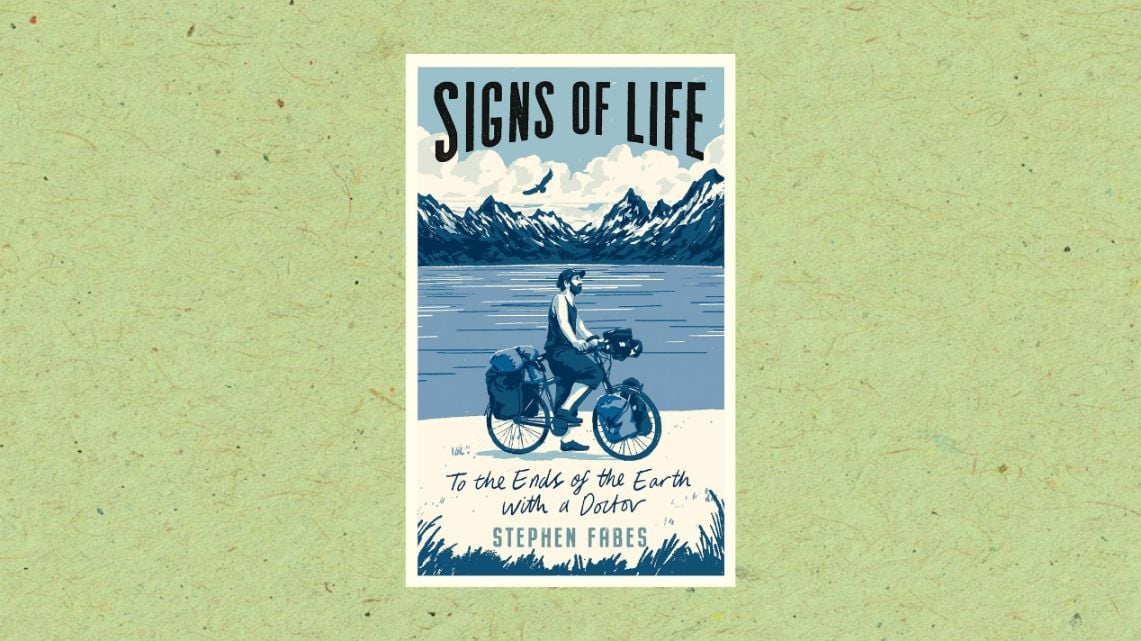Our Book Club pick for October is ‘Signs of Life: To the Ends of the Earth With a Doctor’ by Stephen Fabes. Round-the-world cycling stories can lend themselves to cliché and repetition. What sets Fabes’ book - and his six-year, 53,568-mile pedal around the globe - apart is his medical background, and the topics and specific places that he chooses to visit as a result. Fabes is an empathetic, considerate writer - historically-engaged while still full of humour.
Fabes left his job as a junior doctor to embark on his grand adventure in 2010. “Uncertainty, whether in life or bike rides, is the heart and soul of any journey,” he writes at the end of his prologue. The trip would end up taking him from London through Europe, south through Africa to Cape Town, up the east coast of the Americas (via the Extreme Fun Pub in Uyuni and the set of Top Gun in San Diego), over to Australia, through Indonesia, India, Hong Kong, Mongolia and, naturally, an abundance more beyond before returning to the UK.
There are plenty of beautiful landscapes descriptions, but it is the medical content that make ‘Signs of Life’ so notable. There are insights into the life of a doctor - “the tormenting sense of accountability; the late-night palpitations as you wonder whether forgetting one of the seventeen causes of epigastric pain will have consequences you will never forget” - and as Fabes travels, he finds himself drawn to explore health care at the margins of the world.
In Nepal, Fabes visits a hospital near Kathmandu and meets Parbati, who suffers from leprosy, “perhaps the most mythologised of all diseases”, which “less than five percent of people are even susceptible to catching”. In India he visits a mental health rehab clinic in Mumbai. Mental health is “in the margins of the margins” in the country, he writes. “It’s inevitable that there are ways we treat the mentally ill today that will be seen as abhorrent a hundred years from now.”
The malnourished nomads of Turkana, in northern Kenya, bring Fabes to reflect on how societal disadvantage devastates the people of Britain too. “Like the people of Turkana, many of my patients (the homeless and addicted in particular) were taken for feckless or for victims, unwilling or unable to help themselves, and it made me bristle that agency and victimhood were seen, too often, as incompatible things,” he writes.
We are educated on “Paris Syndrome”, where tourists can "reel and even vomit, all out of sheer distress” when they discover Paris is not the cliché they longed for. Fabes covers the anatomy of the fingernail and how it can be “a record of a life” - and we learn how medicine was used as a defence for colonial rule.
Fabes is an intensely self-aware and comical writer - “tourists were naff people: shrill, bovine, jowly weirdos with knapsacks and visors. I was An Adventurer, at least that’s what I told my mum during our strictly scheduled phone calls.”
In amongst all of this there are police escorts through Egypt, gun-point awakenings in Bolivia and rides across frozen lakes on the edge of Siberia. The comedy does not come at the expense of poignancy either - a late visit to a “sprawling camp of refugees and migrants” in Calais reminding Fabes of the Syrians who treated him to a spontaneous and abundant birthday celebration when he happened to turn 30 on the road to Damascus years previous.
With enough room left for philosophising and societal and political commentary, 'Signs of Life' pairs history, wit and wanderlust to fantastic effect.
This article contains affiliate links. Which basically means we make a little commission if you click through and buy something. It doesn’t cost you anything, and it just means we can do more good things in good places.

